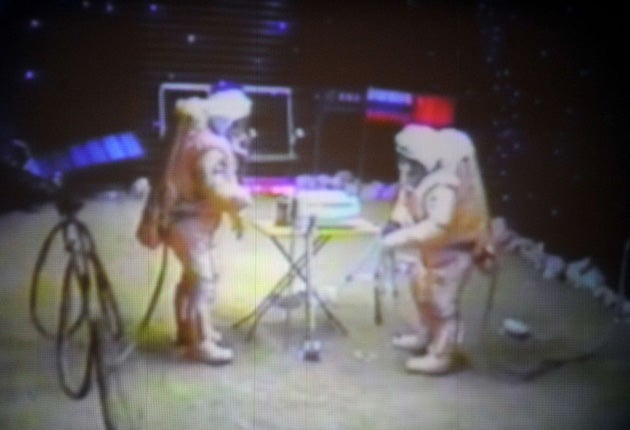One small step: the 250-day space odyssey done without leaving home

After more than 250 days in isolation, three participants of a simulated mission to Mars stepped out to a mock-up of the red planet in Moscow and planted flags in the sand yesterday. The Mars500 experiment, at the Institute for Medical and Biological Problems in the Russian capital, is being carried out with the European Space Agency and China's space training centre.
It was on a hot day last June when the six-man international crew entered the simulated spacecraft at the research centre. Ever since, they have been crammed inside under conditions that replicate the monotony and claustrophobia of a journey to Mars in every way except the weightlessness.
The crew has small living compartments and separate modules for exercise and experiments. They can only communicate with the outside world through email, which was subjected to increasing delays as the crew supposedly got further away from Earth. They have eaten canned and dried food, as is provided on real missions.
After the simulated landing on Saturday, three of the crewmembers donned spacesuits weighing 30kg and emerged yesterday to the "surface" of Mars, which is a sand-filled room that has been next to them throughout their entire journey. The astronauts planted flags of Russia, China and the European Space Agency in the sand, collected samples from the surface and conducted fake scientific experiments.
"We have made great progress today," Vitaly Davydov, the deputy head of the Russian Federal Space Agency, told journalists at Korolyov, Russia's Mission Control Centre for real space journeys, as the images of the "landing" were beamed through. "The crew feel fine," he said.
The bizarre nature of the experiment has led many to feel that the six people involved are more space cadets than space pioneers. But top scientists behind the project insist that studying the physical and psychological effects of such a long time in isolation will be crucial for real missions to Mars.
Martin Zell, a European Space Agency official overseeing the experiment, told the Associated Press yesterday that the experiment was a "really strong asset for future undertakings of mankind in space, for its ambition to fly finally to the red planet".
Scientists estimate that a real journey to Mars is at least 20 or 30 years away. President Barack Obama said last month that astronauts could be sent on a mission to orbit Mars by the mid 2030s.
The crew will conduct several experiments before sealing the doors of its spacecraft again early next month and setting off on the voyage back to Earth. The experiment is due to be completed in November.
Join our commenting forum
Join thought-provoking conversations, follow other Independent readers and see their replies
Comments
Bookmark popover
Removed from bookmarks